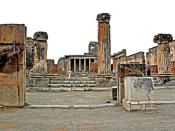1
Thousands of years after the fall of the Roman Empire the wreckage of a once thriving capitol tells a story of an empire that burned across the eastern and western portions of what is now the European continent. Ruins such as the Coliseum linger to remind the world that once there was a great empire that marked itself not only in size but in innovation as well. Perhaps equally as important as the models of the arch and the dome giving life to aqueducts and amphitheaters is the impression created by a intricate legal system. With the founding of the Law of the Twelve Tables in the early republic, the Roman legal system was born and maintained a formalism that endured for 1,000 years. (Crook, 1967) The Romans recognized that exact form, not the intention, of words or of actions produced legal consequences and that there was a witness to actions and words but not intentions.
This notion along with the adoption of new ideas and extending legal principles became vital to the complex environment of the Roman Empire. As the world expanded and Roman legal thought was lost, found, and altered, an eternal skeleton much like those of the arches and domes can be revealed in legal systems throughout the world. Legal historian Paul Koachaker was quoted to have said, "Roman law is a rinculum iuris quo tofiens occidens continetur-a bond of law by which so often the West is held together." (Wieacker, 1981) With such a perpetual impact on a vital organ of society, Roman law can be discovered in its concepts, issues, and application.
Concepts
At the turn of the 5th century BC, the early Roman republic began to recognized the need for written law because they wanted to prevent the magistrates from...


